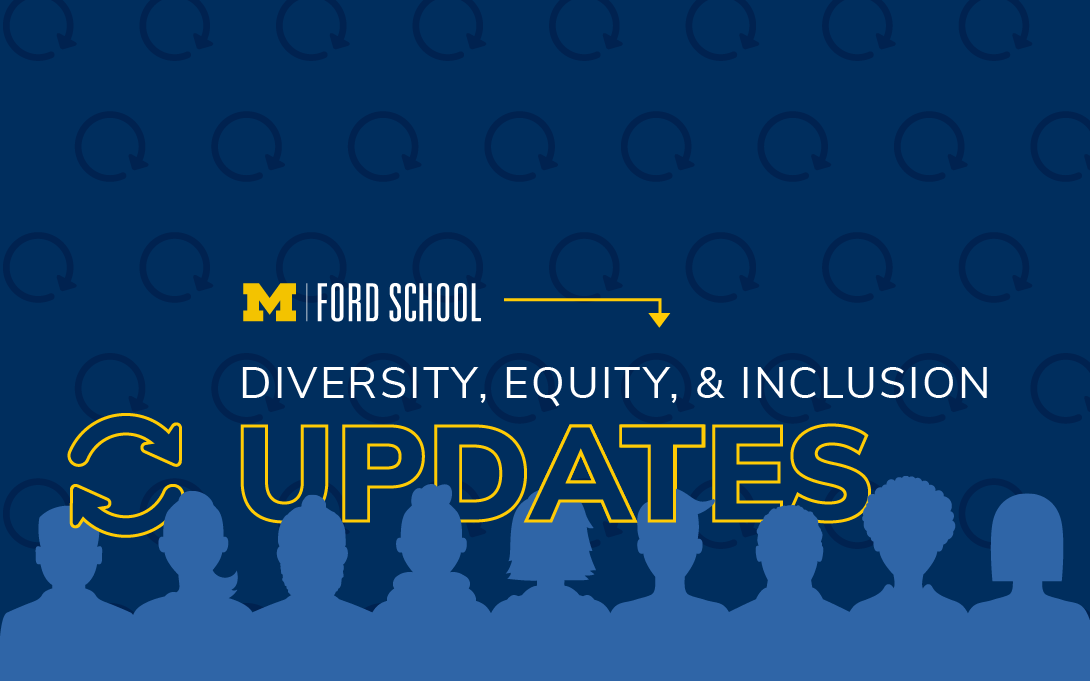
Updates regarding faculty, staff, and student DEI-related activity at the Ford School
Diversifying who we are
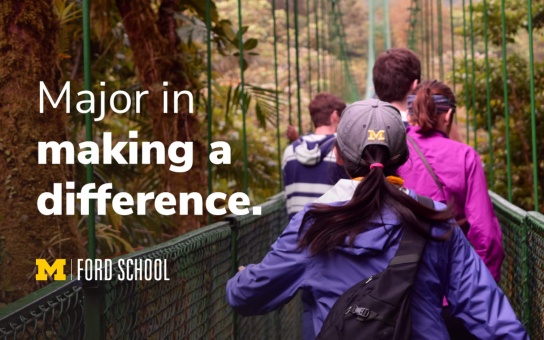
Students connected one-on-one with the Ford School of Public Policy and 50 of the top public policy and international affairs programs from across the county during the October PPIA Public Service Expo. During the online chat, prospective applicants had an opportunity to ask questions about various policy programs, what makes a strong candidate, and carefully consider which programs align with their interests and careers.
During the month of October, Student & Academic Services hosted an undergraduate information session for students interested in the Ford School of Public Policy.
Diversifying what and how we teach
Course spotlight
Looking for courses to take during the winter term? We’ve highlighted a few course offerings that strengthen your regional knowledge and expertise while helping you meet your degree requirements. The course spotlight for this month includes:
Pub Pol 626: History & Future of Detroit. No large American city grew more rapidly than Detroit from 1900 to the 1930s. Thanks to Henry Ford and the automobile manufacturing, Detroit became the prosperous axis mundi of the world vehicle industry. After World War II, Detroit seemed poised to continue growing. The course focuses upon the history of Detroit emphasizing both the long history of labor-management and black-white conflicts and recent efforts to make Detroit a diverse, welcoming city with a higher quality of life and numerous job opportunities. This course is taught by Professor Emeritus of Sociology, Reynolds “Ren” Farley ([email protected]) on Monday and Wednesday from 11:30 am-12:50 pm ET.
PubPol 750: From Voting Rights to Economic Rights: Increasing Economic Mobility through Community Development in America’s Deep South. Economic mobility in the United States is lowest among people of color and those who live in persistent poverty areas. This course will explore the role community development plays in increasing economic mobility in America’s Deep South, a region comprised of states with the highest proportions of Blacks in the population, and that is home to 1/3 of the nation’s persistent poverty counties, and examine the nexus between community development practice and policy. This course is taught by Towsley Policymaker in Residence, William “Bill” Bynum ([email protected]) on Friday’s from 9:00 - 10:50 am ET.
Promoting an equitable and inclusive climate
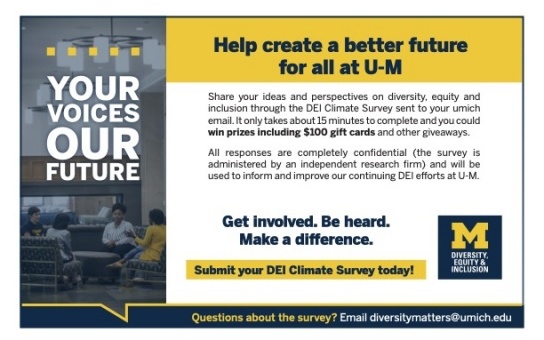
U-M has launched a campuswide climate survey, which will provide invaluable insight into our current climate regarding diversity, equity and inclusion (DEI). This survey will also provide faculty, staff, and students with the opportunity to share their perspectives, opinions and experiences associated with DEI at U-M and at the school/college and unit levels in a confidential manner.
Email invitations to take the web-based survey were sent beginning October 28. The survey takes about 15 minutes to complete. To ensure confidentiality, it will be administered by an independent, third-party firm, SoundRocket. All survey participants have a chance to win prizes including $100 gift cards and other giveaways.
The results of the survey will provide us with data for measuring our current climate against the 2017 climate survey data. The results will also offer insight into key climate issues that warrant a deeper level of assessment, and provide actionable data to schools, colleges and units that can inform our new DEI strategic plans. Read more in the University Record.
DEI funding
DEI funding is available to Ford School student organizations who implement initiatives that promote DEI related values. The purpose of the funding is to encourage student-led programming that advance the Ford School’s four central pillars. All DEI funding proposals should be submitted to Stephanie Sanders ([email protected]).
In collaboration with other Public Policy Schools, Graduate Career Services co-hosted Identities in the Workplace: Career Fair 2021. This initiative is a collaboration between Duke's Sanford School of Public Policy, Harvard Kennedy School, Princeton's School of Public and International Affairs, and University of Michigan Ford School of Public Policy. The Career Fair aimed to foster connections between current students, alumni, and employers who are committed to diversity, equity, and inclusion. Four alumni panels were held throughout the month of October that focused on Marginalized Racial and Ethnic Identities in the Workplace, Navigating Identity and Social Norms with LGBTQIA Alumni, Alumni with Disabilities and Neurological Variations, and First-Gen Alumni Navigating Careers and the Workplace.
The Ford School hosted Donuts & Deans. Free fresh apple cider and donuts were served under the courtyard tent by the deans—Dean Michael Barr, Associate Dean Celeste Watkins-Hayes, and Associate Dean Luke Shaefer.
The Ford School Community Building Committee hosted the Ford School Fall Festival. Faculty, staff, and students were invited to attend the festival that featured fun, food, and games in the Weill Hall Courtyard!
Diversifying our research and policy engagement
In an opinion written for the Detroit Free Press, Towsley Foundation Policymaker in Residence Abdul El-Sayed calls for Congressional policymakers to preserve the water affordability and infrastructure measures included in the Infrastructure Investment and Jobs Act and the Build Back Better Reconciliation Bill. Read the full op-ed on the Detroit Free Press.
The estate of Henrietta Lacks sued a biotechnology company on Monday, accusing it of selling cells that doctors at Johns Hopkins Hospital took from the Black woman in 1951 without her knowledge or consent as part of “a racially unjust medical system.” Shobita Parthasarathy professor of public policy, who has researched issues around intellectual property in biotechnology, comments on the racial reckoning in science and medicine.
A team of experts are working to ensure a “just future” for Black and Native communities in the form of reparations. U-M’s Center for Social Solutions is almost a year into research for the project “Crafting Democratic Futures: Situating Colleges and Universities in Community-based Reparations Solutions.” Earl Lewis , founding director of the center and principal investigator for the project speaks about racial healing.
Upcoming events
An introduction to somatic resourcing
November 2 | 4:00 - 5:30 pm ET
Featuring CAPS embedded counselor Kristen Carney
Somatic resourcing and embodiment practices can be used in times of need to cope with stress or process experiences. In this psychoeducational and experiential workshop, participants will learn about the body’s response to stress and trauma patterns, build awareness around somatic narrative, and engage in somatic experiments that can be used as supportive coping tools.
Registration is limited to 30 participants. Please RSVP if you are interested in attending. Got questions? Contact Kristen Carney at [email protected].
National identity in Puerto Rico
November 3 | 6:00 - 7:00 pm ET
Featuring Dr. Jorge Duany, professor of anthropology at Florida International University
Ford School student organization, The International Policy Student Association is thrilled to host Florida International University’s Dr. Jorge Duany. Dr. Duany will discuss issues around Puerto Rican sovereignty, the island’s relationship with the mainland-U.S., and various definitions of “nationhood.” The presentation will also briefly cover the colonial history of Puerto Rico under U.S. hegemony since 1898. This event will be held via Zoom. Registration is required.
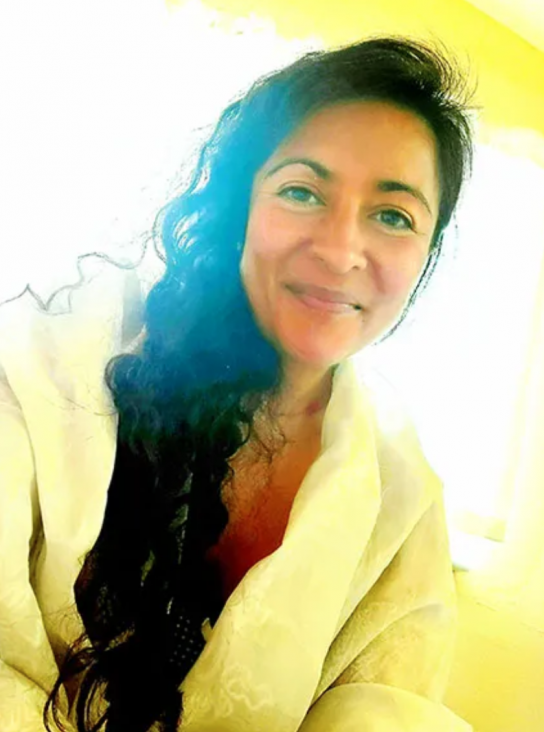
Indigenous cosmologies and the relational earth consciousness
November 3 | 7:00 pm ET
Featuring Yuria Celidwen
The U-M Program in Creativity and Consciousness Studies, in collaboration with Detroit’s College for Creative Studies, is happy to announce the first talk of its 2021-2022 lecture series: Yuria Celidwen: “Indigenous Cosmologies And The Relational Earth Consciousness.”
Registration is required to attend the event.
Native American Heritage Month: Opening ceremony
November 3 | 7:30 - 9:00 pm ET
Featuring Dr. Adrienne Keene
Join the Office of Multi-Ethnic Student Affairs for the opening ceremony of Native American Heritage Month. Dr. Adrienne Keene (Cherokee Nation) is a Native scholar, writer, blogger, podcast host, and activist. She is passionate about reframing how the world sees contemporary Native cultures. She is the creator and author of Native Appropriations, a blog discussing cultural appropriation and stereotypes of Native peoples in fashion, film, music, and other forms of pop culture. Register to attend the event.
The story of the expanded Child Tax Credit
November 5 | 12:00 - 1:00 pm ET
Real World Perspectives on Poverty Solutions series
H. Luke Shaefer is the director of Poverty Solutions, the Hermann and Amalie Kohn Professor of Social Justice and Social Policy, and a professor of social work at U-M. He is among a group of poverty scholars who have contributed significant research on the potential for an expanded Child Tax Credit that follows the design of a child allowance to reduce child poverty rates in the U.S. Shaefer will host a panel discussion on the implications of the expanded Child Tax Credit and the potential for the U.S. to adopt a permanent child allowance. All talks in this series are free and open to the public.
Día de los Muertos Ball
November 5 | 7:00 pm ET
with Beta Omicron Chapter of Lambda Theta Alpha Latin Sorority, Incorporated
Beta Omicron, Incorporated is hosting their 9th annual semi-formal Dia De Los Muertos Ball taking place on Friday, November 5th, 2021 at 7 pm EST in the Assembly Hall at the Rackham Graduate School. Día de Los Muertos, or Day of the Dead, is a traditional holiday celebrated in Mexico and throughout Latino America that commemorates the lives of those who have passed. This event is free and open to the public.
Veterans Week 2021
November 8 - 12
This annual event features a week of programming that educates and celebrates the experiences and sacrifice of those who have served our country. All events are free and are open to the entire university community and to the general public unless otherwise noted. If you have any questions about this year’s events, please email Philip Larson, program director for U-M Veteran and Military Services, at [email protected].
Racial foundations of immigration policy
November 9 | 4:00 - 5:30 pm ET
Racial Foundations of Public Policy series
Jennifer Lee—the Julian Clarence Levi Professor of Social Sciences at Columbia University, and past president of the Eastern Sociological Society—will join us virtually on November 9 to discuss the racial foundations of immigration policy. Racial Foundations of Public Policy is a fall 2021 virtual speaker series that focuses on the historical roots and impact of race in shaping public policy as both a disciplinary field and as a course of action. The series is open to all members of the U-M community and the wider public. Registration is required.
Redesigning healthcare towards equity
November 10 | 12:00 - 12:50 pm ET
Public Policy and Institutional Discrimination discussion series
Facilitated by faculty discussant and Towsley Foundation Policymaker in Residence Abdul El-Sayed, this session focuses on health equity, why it matters, and the role of policy in creating equitable outcomes. The series, open to U-M students, faculty, and staff, is designed to foster dialogue on important issues of U.S. public policy. Registration is required.
Representative research: Assessing diversity in online samples
November 10 | 12:00 - 1:10 pm ET
Inclusive Research Matters series
Join Frances Barlas, Vice President, Research Methods at IPSOS Public Affairs, who will speak on Representative Research: Assessing Diversity in Online Samples.The Institute for Social Research is the world’s largest academic social science survey and research organization. ISR is a leader in developing and applying new social science methods, and is committed to educating the next generation of social scientists.
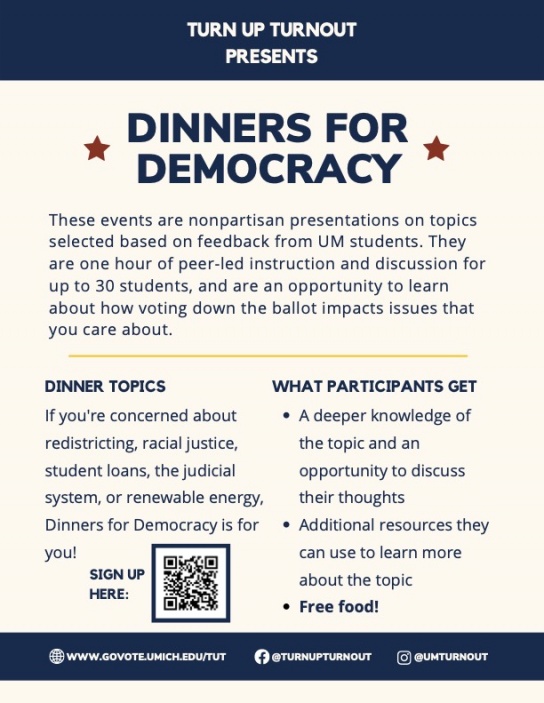
Dinner for Democracy on the judicial system
November 11 | 5:30 - 6:30 pm ET
Dinners for Democracy is a series of interactive workshops on issues important to college students such as the politics of renewable energy, the judicial system, and student loans. Dinners are led by a student or team of students, and include information about the topic as well as how your vote in local elections matters for that topic. Each Dinner takes about an hour, via Zoom, and to encourage participation each participant will receive a gift card to a local restaurant or store. These events are held by Turn Up Turnout, are open to any University of Michigan student, and can be found on Sessions. If you would like to get involved, email Turn Up Turnout at [email protected].
Viewing: Detroit Food Summit's keynote speech by Tunde Way
November 17 | 6:00 - 8:00 pm ET
U-M Sustainable Food Program
The U of M Sustainable Food Program, UMSFP) is hosting a viewing session and discussion about the Detroit Food Summit's keynote speech in the Vandenberg Room in the Michigan League. For more information contact Morgan Anderson.
The Human Right to a Healthy Environment
November 18 | 4:15 pm ET
Donia Human Rights Center Lecture
John H. Knox is the Henry C. Lauerman Professor of International Law, Wake Forest University; UN Special Rapporteur on Human Rights and the Environment, 2012-2018. In October of this year, the United Nations Human Rights Council recognized for the first time the human right to a safe, clean, healthy and sustainable environment. Why did the Council finally adopt this right? What effect will recognition have? How might the right contribute to the ongoing application of human rights to environmental issues such as climate change and the conservation of biodiversity?
This event is co-sponsored by: University of Michigan Graham Sustainability Institute and Gerald R. Ford School of Public Policy Weiser Diplomacy Center and International Policy Center. Registration is required.
Trans visibility passport day
November 19 | 12:00 - 2:00 pm ET
The School of Social Work Office of Global Activities and U-M Spectrum Center are collaborating to host Trans Visibility Passport Day. During this event, the Washtenaw County Clerk's office will assist students and community members to apply for, renew, or make changes to their passport in the form of a name change or updated gender marker. Several documents must be prepared in advance. Details are available on the registration page.
The gender gap in summer work interruptions
November 29 | 12:00 - 1:00 pm ET
Population Studies Center Brown Bag series
Join Melanie Wasserman—assistant professor of economics at the UCLA Anderson School of Management— who will speak on The Gender Gap in Summer Work Interruptions. Melanie Wasserman's research investigates the mechanisms underlying gender differences in labor market and educational outcomes. She was a postdoctoral fellow at the Michigan Population Studies Center after completing her Ph.D. in economics at MIT.
Learning and development
November is Native American Heritage Month. Although the first "American Indian Day" was celebrated in May 1916 in New York, a month-long recognition of Native Americans did not happen until 1990. That year, President George H.W. Bush signed a joint congressional resolution designating November as National American Indian Heritage Month. Since then, the title has expanded to celebrate the heritage, history, art, and traditions of American Indians and Alaska Natives. This year we honor the histories, cultures and contributions of American citizens whose ancestors had lived in North America for hundreds of years. MESA and the Native American Student Association collaborate with campus partners to bring a wide range of events that celebrate Native American culture with the University of Michigan campus community
Faculty are invited to join the U-M LGBT Faculty Alliance. The Faculty Alliance was started in 1992 and focuses on LGBT university policies, curriculum development, students’ academic/career needs and faculty support. Since 2017, ADVANCE has worked with the Faculty Alliance to host networking events. For more details and to join the email group, please email [email protected].
To learn more about how to share pronouns on frequently used platforms such as Wolverine Access, Zoom, and Canvas visit the Spectrum Center website.
Resources
- Maize and Blue Cupboard
- Office of Student Conflict Resolution (734-936-6308)
- Veterans and Military Services (734-764-6413)
- Virtual resources to provide resources and connect students virtually: https://admissions.umich.edu/explore-visit/virtual-resources
- Financial Assistance & Funding Opportunities for unanticipated financial challenges
- Ford School Emergency Fund: $500 limit, email [email protected] for more information.
- U-M Financial Aid TV [ ] U-M partnered with Financial Aid TV to offer step-by-step information about the aid process and tips about financial literacy using more than 1,000 available videos.
- Rackham Student Emergency Funds: graduate students only, up to $2,500, see eligibility details on the website.
- Dean of Students Emergency Fund: undergraduate and graduate students, see website for more information.
- CEW+ Emergency Fund: graduate students and underserved undergraduate students (including but not limited to: returning students, those with children, emancipated, first generation, transfer students).